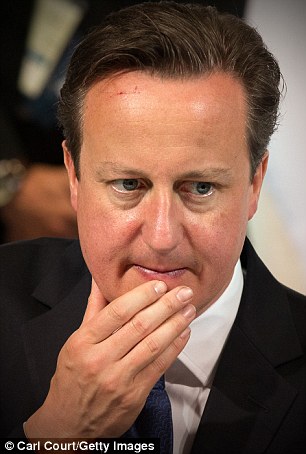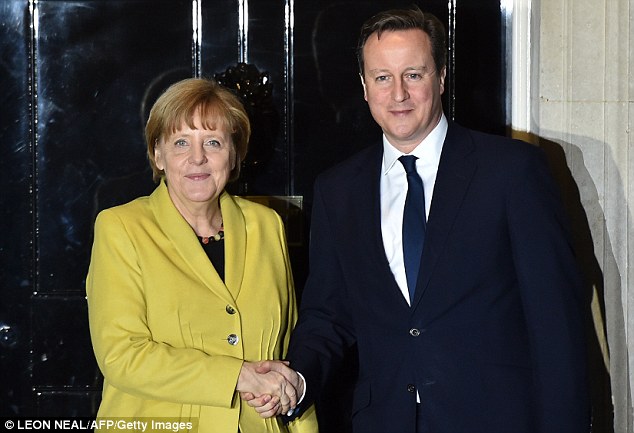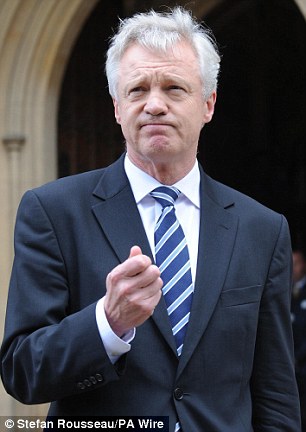Welcome to Britain in 2020, a confident, successful, free and wealthy nation that is thriving now it is out of the EU....
A vision of Britain outside the EU - confident, successful and free
Released from our Eurochains, pessimism withers and the economy grows as we become great again

Outside the EU, Britain would forge a distinctive foreign policy, allied to Europe, but giving due weight to the US, India and other Anglophone democracies. Photo: ALAMY

By Daniel Hannan, Conservative MEP for South East England
02 Jun 2015
 955 Comments
955 Comments
It’s 2020, and the UK is flourishing outside of the EU. The rump Union, now a united bloc, continues its genteel decline, but Britain has become the most successful and competitive knowledge-based economy in the region. Our universities attract the world’s brightest students. We lead the way in software, biotech, law, finance and the audio-visual sector. We have forged a distinctive foreign policy, allied to Europe, but giving due weight to the US, India and other common-law, Anglophone democracies.
More intangibly but no less significantly, we have recovered our self-belief. As Nicolas Sarkozy, President of the European Federation, crossly put it: “Britain has become Hong Kong to Europe’s China.”
Part of our success rests on bilateral free-trade agreements with the rest of the world. The EU has to weigh the interests of Italian textile manufacturers, French filmmakers, Polish farmers. Even Germany likes to defend its analogue-era giants against American internet challengers such as Google, Amazon, Facebook and Uber.
Once outside the Common External Tariff, the UK swiftly signed a slew of free-trade agreements, including with the US, India and Australia. Our policy is like Switzerland’s: we match EU trade negotiators when convenient, but go further when Brussels is reluctant to liberalise, as with China. Following Switzerland, we forged overseas relationships while remaining full members of the EU’s common market – covered by free movement of goods, services and capital.
Non-EU trade matters more than ever. Since 2010, every region in the world has experienced significant economic growth – except Europe. The prosperity of distant continents has spilled over into Britain. Our Atlantic ports, above all Glasgow and Liverpool, which were on the wrong side of the country when the EU’s customs duties were imposed in the Seventies, are entering a second golden age.
London, too, is booming. Eurocrats never had much sympathy for financial services. As their regulations took effect – a financial transactions tax, a ban on short-selling, restrictions on clearing, a bonus cap, windfall levies, micro-regulation of funds – waves of young financiers brought their talents from Frankfurt, Paris and Milan to the City.
Other EU regulations, often little known, had caused enormous damage. The Reach Directive, limiting chemical products, imposed huge costs on manufacturers. The bans on vitamin supplements and herbal remedies had closed down many health shops. London’s art market had been brutalised by EU rules on VAT and retrospective taxation. All these sectors have revived. So have older industries. Our farmers, freed from the CAP, are world-beating. Our fisheries are once again a great renewable resource. Disapplying the EU’s rules on data management made Hoxton the global capital for software design. Scrapping EU rules on clinical trials allowed Britain to recover its place as a world leader in medical research.
Universities no longer waste their time on Kafkaesque EU grant applications. Now, they compete on quality, attracting talent from every continent and charging accordingly.
Immigration is keenly debated. Every year, Parliament votes on how many permits to make available for students, medical workers and refugees. Every would-be migrant can compete on an equal basis: the rules that privileged Europeans over Commonwealth citizens, often with family links to Britain, were dropped immediately after independence.

A shale gas exploration well at Barton Moss, near Manchester, in 2013
Britain has been able to tap into its huge reserves of shale gas and oil, which came on tap, almost providentially, just as North Sea gas was running out. At the same time, the free-trade deal with China has led to the import of cheap solar panels, which the EU had banned. They are now so integrated into buildings and vehicles that we barely notice them. Cheaper energy means lower production costs, more competitive exports and a boom all round.
Unsurprisingly, several other European states opted for a similar deal. Some (Norway, Switzerland) came from the old European Free Trade Association; others (Sweden, Denmark) from the EU; yet others (Turkey, Georgia) from further afield. The United Kingdom leads a 21-state bloc that forms a common market with the EU 25, but remains outside their political structures. The EU 25, meanwhile, have pushed ahead with full integration, including a European army and police force and harmonised taxes, prompting Ireland and the Netherlands to announce referendums on whether to follow Britain.
 Britain's capital is the world's greatest city
Britain's capital is the world's greatest city
Best of all, we have cast off the pessimism that infected us during our EU years, the sense that we were too small to make a difference. As we left, we shook our heads, looked about, and realised that we were the fifth largest economy on Earth, the fourth military power, a leading member of the G8, a permanent seat-holder on the UN Security Council, and home to the world’s greatest city and most widely spoken language. We knew that we had plenty more to give.
A vision of Britain outside the EU - confident, successful and free - Telegraph
A vision of Britain outside the EU - confident, successful and free
Released from our Eurochains, pessimism withers and the economy grows as we become great again

Outside the EU, Britain would forge a distinctive foreign policy, allied to Europe, but giving due weight to the US, India and other Anglophone democracies. Photo: ALAMY

By Daniel Hannan, Conservative MEP for South East England
02 Jun 2015

It’s 2020, and the UK is flourishing outside of the EU. The rump Union, now a united bloc, continues its genteel decline, but Britain has become the most successful and competitive knowledge-based economy in the region. Our universities attract the world’s brightest students. We lead the way in software, biotech, law, finance and the audio-visual sector. We have forged a distinctive foreign policy, allied to Europe, but giving due weight to the US, India and other common-law, Anglophone democracies.
Part of our success rests on bilateral free-trade agreements with the rest of the world. The EU has to weigh the interests of Italian textile manufacturers, French filmmakers, Polish farmers. Even Germany likes to defend its analogue-era giants against American internet challengers such as Google, Amazon, Facebook and Uber.
Once outside the Common External Tariff, the UK swiftly signed a slew of free-trade agreements, including with the US, India and Australia. Our policy is like Switzerland’s: we match EU trade negotiators when convenient, but go further when Brussels is reluctant to liberalise, as with China. Following Switzerland, we forged overseas relationships while remaining full members of the EU’s common market – covered by free movement of goods, services and capital.
Non-EU trade matters more than ever. Since 2010, every region in the world has experienced significant economic growth – except Europe. The prosperity of distant continents has spilled over into Britain. Our Atlantic ports, above all Glasgow and Liverpool, which were on the wrong side of the country when the EU’s customs duties were imposed in the Seventies, are entering a second golden age.
London, too, is booming. Eurocrats never had much sympathy for financial services. As their regulations took effect – a financial transactions tax, a ban on short-selling, restrictions on clearing, a bonus cap, windfall levies, micro-regulation of funds – waves of young financiers brought their talents from Frankfurt, Paris and Milan to the City.
Other EU regulations, often little known, had caused enormous damage. The Reach Directive, limiting chemical products, imposed huge costs on manufacturers. The bans on vitamin supplements and herbal remedies had closed down many health shops. London’s art market had been brutalised by EU rules on VAT and retrospective taxation. All these sectors have revived. So have older industries. Our farmers, freed from the CAP, are world-beating. Our fisheries are once again a great renewable resource. Disapplying the EU’s rules on data management made Hoxton the global capital for software design. Scrapping EU rules on clinical trials allowed Britain to recover its place as a world leader in medical research.
Universities no longer waste their time on Kafkaesque EU grant applications. Now, they compete on quality, attracting talent from every continent and charging accordingly.
Immigration is keenly debated. Every year, Parliament votes on how many permits to make available for students, medical workers and refugees. Every would-be migrant can compete on an equal basis: the rules that privileged Europeans over Commonwealth citizens, often with family links to Britain, were dropped immediately after independence.

A shale gas exploration well at Barton Moss, near Manchester, in 2013
Britain has been able to tap into its huge reserves of shale gas and oil, which came on tap, almost providentially, just as North Sea gas was running out. At the same time, the free-trade deal with China has led to the import of cheap solar panels, which the EU had banned. They are now so integrated into buildings and vehicles that we barely notice them. Cheaper energy means lower production costs, more competitive exports and a boom all round.
Unsurprisingly, several other European states opted for a similar deal. Some (Norway, Switzerland) came from the old European Free Trade Association; others (Sweden, Denmark) from the EU; yet others (Turkey, Georgia) from further afield. The United Kingdom leads a 21-state bloc that forms a common market with the EU 25, but remains outside their political structures. The EU 25, meanwhile, have pushed ahead with full integration, including a European army and police force and harmonised taxes, prompting Ireland and the Netherlands to announce referendums on whether to follow Britain.

Best of all, we have cast off the pessimism that infected us during our EU years, the sense that we were too small to make a difference. As we left, we shook our heads, looked about, and realised that we were the fifth largest economy on Earth, the fourth military power, a leading member of the G8, a permanent seat-holder on the UN Security Council, and home to the world’s greatest city and most widely spoken language. We knew that we had plenty more to give.
A vision of Britain outside the EU - confident, successful and free - Telegraph
Last edited:

















